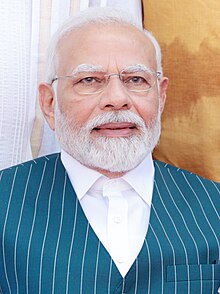
Back নরেন্দ্র মোদীর প্রধানমন্ত্রিত্ব Bengali/Bangla Gouvernement de Narendra Modi French नरेन्द्र मोदी का प्रधानमंत्रित्व Hindi നരേന്ദ്ര മോദിയുടെ പ്രീമിയർഷിപ്പ് Malayalam 2014 - 2019 இந்திய நடுவண் அரசின் நிர்வாகம் Tamil نریندر مودی کا عہد وزارت عظمی Urdu
 | |
| Premiership of Narendra Modi 26 May 2014 – present | |
| Party | Bharatiya Janata Party |
|---|---|
First term 26 May 2014 – 30 May 2019 | |
| Cabinet | First |
| Election | 2014 |
| Appointed by | President Pranab Mukherjee |
| Seat | Varanasi |
Second term 30 May 2019 – Present | |
| Cabinet | Second |
| Election | 2019 |
| Appointed by | President Ram Nath Kovind |
| Seat | Varanasi |
|
| |
| Official website | |
The premiership of Narendra Modi began on 26 May 2014 with his swearing-in as the Prime Minister of India at the Rashtrapati Bhavan. He became the 14th Prime Minister of India,[1] succeeding Manmohan Singh of the Indian National Congress. Modi's first cabinet consisted of 45 ministers, 25 fewer than the previous United Progressive Alliance government.[2] 21 ministers were added to the council of ministers on 9 November 2014.
In 2019, he was elected as the prime minister of India for the second time and sworn in at the Rashtrapati Bhavan on 30 May 2019.[3] His second cabinet consisted of 54 ministers[4] and initially had 51 ministers, which was expanded to 77 ministers during a reshuffle on 7 July 2021.[5] His premiership has, to a considerable extent, practiced high command culture.[6]
Some media sources cite India experiencing democratic backsliding under Modi's premiership,[7] however this claim is denied by other sources.[8]
- ^ "Narendra Modi appointed Prime Minister, swearing in on May 26". The Times of India. PTI. 20 May 2014. Archived from the original on 2 April 2019. Retrieved 21 May 2014.
- ^ Irfan, Hakeem (28 May 2014). "Narendra Modi saves Rs 125 crore by keeping Cabinet small". Dnaindia.com. Archived from the original on 9 August 2016. Retrieved 17 October 2021.
- ^ "Modi Swearing-in Highlights: New team blend of youthful energy, experience: PM". Live Mint. 30 May 2019. Archived from the original on 11 January 2021. Retrieved 10 January 2021.
- ^ Varma, Shylaja (ed.). "Who Gets What: Cabinet Portfolios Announced. Full List Here". NDTV. Archived from the original on 31 May 2019. Retrieved 10 January 2021.
- ^ "Narendra Singh Tomar Takes Additional Charge of Food Processing Ministry After Harshimrat Badal Resigns". News18. 23 September 2020. Archived from the original on 25 October 2020. Retrieved 10 January 2021.
- ^ "Frequent change of CMs in BJP-ruled states signs of growing high command culture". The New Indian Express. 11 September 2021. Archived from the original on 5 November 2021. Retrieved 5 November 2021.
- ^ Sirnate, Vasundhara (27 November 2021). "The democratic backsliding of India". The Hindu. Archived from the original on 30 August 2022. Retrieved 30 August 2022.
- ^ Akhilesh, Pillalamarri. "Why India's Democracy is Not Dying". The Diplomat. Archived from the original on 22 May 2023. Retrieved 22 May 2023.
© MMXXIII Rich X Search. We shall prevail. All rights reserved. Rich X Search

